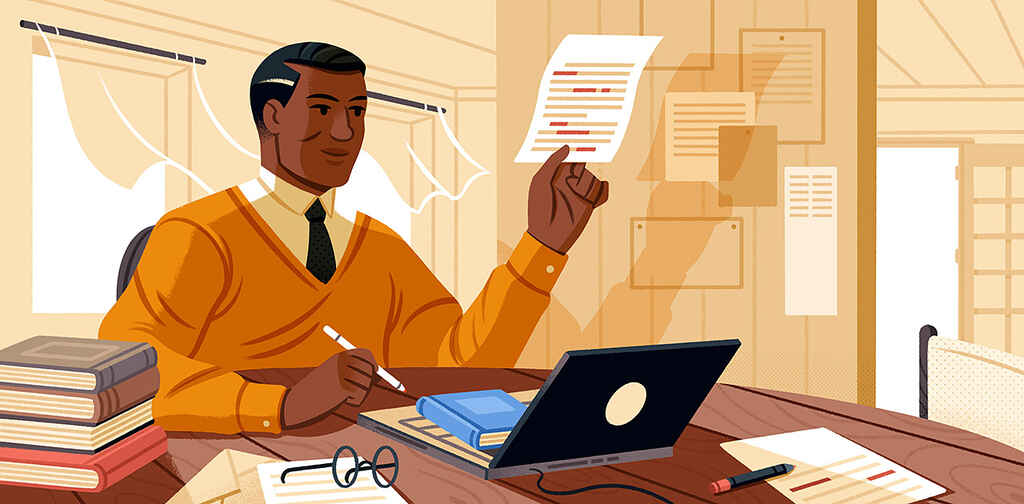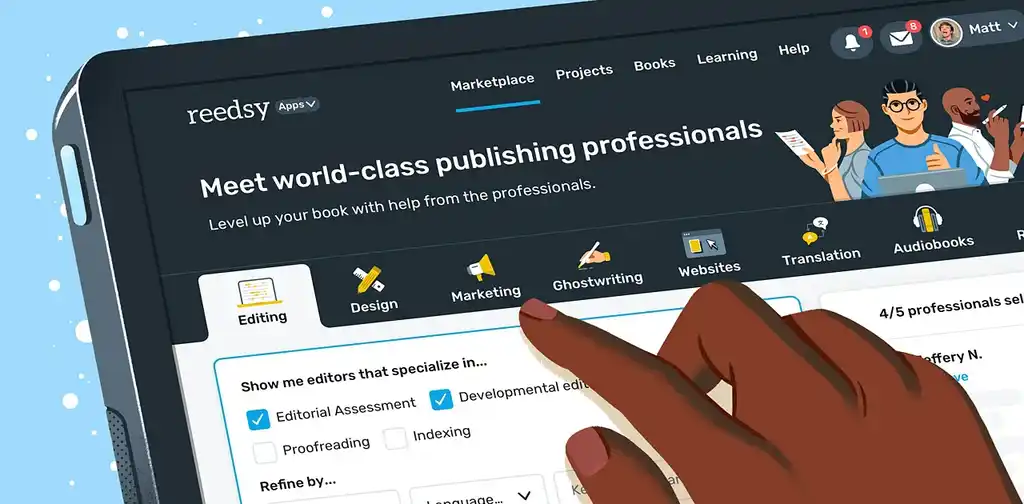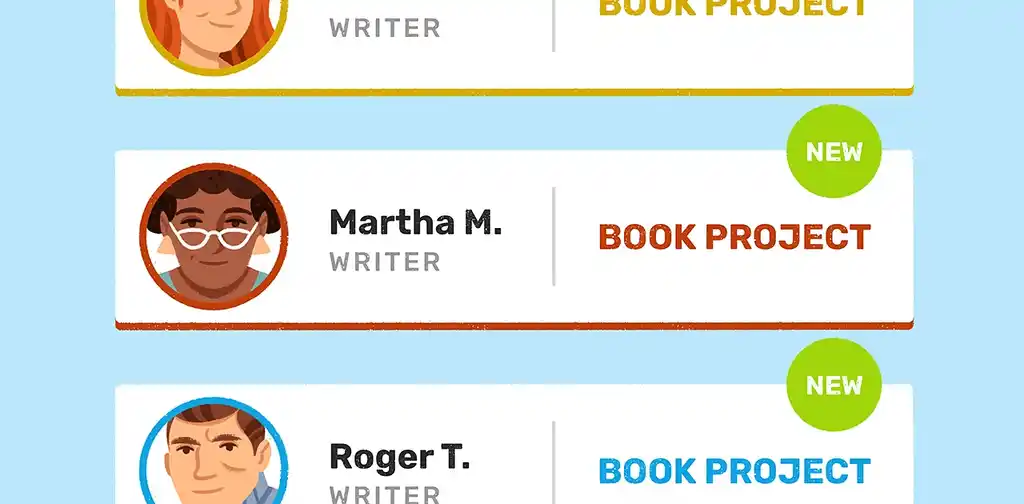Blog •
Last updated on Jun 23, 2025
How to Become a Copy Editor: The Complete Guide
About the author
Reedsy's editorial team is a diverse group of industry experts devoted to helping authors write and publish beautiful books.
More about the Reedsy Editorial Team →Dario Villirilli
Editor-in-Chief of the Reedsy blog, Dario is a graduate of Mälardalen University. As a freelance writer, he has written for many esteemed outlets aimed at writers. A traveler at heart, he can be found roaming the world and working from his laptop.
View profile →In our text-driven world, every industry needs a copy editor to ensure clear and effective communucation. To become a copy editor, you need to develop expert language skills, including a keen eye for grammar, an understanding of regional differences, and an ear for the overall flow of a text. You should also focus on getting familiar with different style guides and gaining practical experience through freelance experience or networking. A degree in English, journalism, or a related field can boost your CV but is not a requirement — whereas a copyediting certificate sometimes is.
Beyond technical accuracy, a great copy editor elevates an author's voice, maintaining consistency in tone and structure. With meticulous attention to detail and a sharp red pencil in hand, copy editors pave the way for effective communication. If that sounds exciting, this guide covers everything you need to know about the profession and how to kick-start your career.
Looking to hire a copy editor, not become one yourself? We’ve got 100+ copy editors available for hire right here.
What do copy editors do?
Understanding the scope of copy editing is crucial for building a successful career. Let’s take a closer look at what the role entails.
Copy editors focus on form and coherence
Copy editing is one of four main types of editing. Typically, a manuscript first undergoes a developmental edit, addressing big-picture elements like structure and themes. Once the overall content is solid, a copy editor steps in to refine the language, ensuring clarity and consistency while adhering to relevant style guides.
Think of it like cooking: developmental editors ensure the soup has all the essential ingredients, while copy editors fine-tune the seasoning to perfection. Afterward, the manuscript moves to a proofreader for a final polish.
Key responsibilities
To excel as a copy editor, you should be familiar with the core aspects of the job, including:
- Checking for spelling, grammar, and punctuation errors
- Revising word usage, repetition, and dialogue tags
- Ensuring clarity, coherence, and consistency
- Refining text formatting (e.g., bold, italics, paragraph breaks)
- Maintaining inclusive and appropriate vocabulary
- Fixing descriptive inconsistencies (characters, locations, etc.)
- Correcting unintentional POV or tense shifts
However, copy editors do not typically:
- Provide feedback on story structure
- Comment on character development
- Alter an author's voice
Q: What does a skilled copy editor bring to a manuscript?
Suggested answer
A skilled copyeditor brings so much to a manuscript aside from the nuts and bolts of editing.
For starters, they should fix errors pertaining to grammar, spelling, punctuation, sentence structure, clarity, timeline, unnecessary word repetitions, and location-specific terminology (for example, a book full of Briticisms that is targeting an American audience will need every Briticism replaced with its American equivalent).
They should never overshadow the author's writing with their own style and should only recast for clarity as needed without changing the meaning.
They should compose a very detailed style sheet that clearly and concisely outlines every aspect of the style choices they've implemented, including sources they used, word spellings, the treatment of numbers, etc.
The purpose of the style sheet is both for the author to see and understand the style choices they've implemented and for the proofreaders and cold readers to continue to implement as they work through the manuscript.
Aside from all of the above, if one has copyedited hundreds of books for the Big Five publishers as I have, in addition to copyediting for The New York Times Magazine, Rolling Stone, and Time Out New York, there is a wealth of knowledge one develops that goes beyond adhering to this rule in The Chicago Manual of Style, 18th ed., or this rule in Words into Type, 3rd ed.
Every imprint of every one of the Big Five publishers has its own style guide that is proprietary and protected by NDA's, which is why I never share any of those specifics with anyone, even though I have access to and knowledge of all of that information.
But the great thing is that every client who works with me through Reedsy gets to benefit from the thousands of hours I've put in to study these styles and develop my own style as an editor that is an amalgam of all of them.
Ian is available to hire on Reedsy ⏺
A skilled editor provides you with a trustworthy perspective and enhances your unique voice by refining the elements that might detract from its clarity and power. They are an invisible partner who helps you achieve your optimal writing goals.
Copy-editing involves mostly technical refinements relating to grammar, punctuation, minor clarity issues, and technical consistency. Line editing goes a little further, taking a deep look at the line and paragraph level regarding tone, flow, structure and meaning of the language. The editor makes suggestions or asks questions that bring the writing to its cleanest, clearest form, and addresses issues such as awkward sentence construction, wordiness, vagueness, jargon, crutch words, repetition and redundancies, minor fact checking, and consistency of style.
I like the analogy of a singer or musician recording their music. They may have extraordinary talent, skill, and heart, but they still need a sound engineer to make sure the recording is clear and beautiful and brings out their voice or composition to its fullest potential.
Clelia is available to hire on Reedsy ⏺
Top tip: To keep track of all creative choices when they're editing, copy editors often create editorial style sheets. Learn more about it here.
What copy editing jobs are there?

Copy editors work in all kinds of industries to provide polished and clean texts, from publishing and journalism to marketing and corporate communications. You can work in-house or as a freelancer, depending on your career goals and personal preferences.

JOIN OUR NETWORK
Supercharge your freelance career
Find projects, set your own rates, and get free resources for growing your business.
In-house copy editing
In-house copy editors typically work for publishers, newspapers, or marketing forms, reviewing manuscripts, articles, or promotional material.
Working in-house offers a steady income with potential benefits and the possibility of career advancement within the organization, but it offers less flexibility and your workload, schedule, and salary are decided by your employer.
Freelance copy editing
Many copy editors choose to go freelance, collaborating with independent authors, journalists, or companies. It is also common to be hired by publishing houses on a freelance basis.
As a freelance copy editor, you’ll have the flexibility of choosing your projects, setting your own rates, and managing your own schedule, but you won’t always have a steady stream of income and will need to invest time towards self-promotion and business administration.
What is a typical copy editor salary?
Regardless of the field, both in-house and freelance copy editors can make good money, depending on their level of expertise.

According to Ziprecruiter, copy editors in the US earn an average of about $60,000 per annum, though this will depend on your level of experience and location, as well as what industry you’re in (hint: publishing is not quite as lucrative as legal copy editing).
As a freelance editor, on the other hand, you set your own rates. On the Reedsy marketplace, copy editors charge an average of $0.024 per word or $1,600 per 70k word project. That means that you’d have to take on about two to three projects per month for an annual take-home of $50–60k. The more experience you have, the more you can charge — so your rates should increase as you gain expertise.
For more detailed information on how to set your editing rates, check out this article.

FREE RESOURCE
Invoice Template
Provide billing and payment details with this professional template.
What qualifications and skills do you need?
While you don’t strictly need a publishing degree to become a copy editor, you’ll need a mix of technical and interpersonal skills to do your job well.
Let’s briefly look at what basic skills you need before you can start looking for copy editing jobs.
Copyediting certification and training
It goes without saying that you need to have expert knowledge of English grammar and syntax to be a good copy editor. You can learn the foundations by pursuing a degree in something like English, communication, or journalism, but to go from a skilled layman to a true professional you should consider getting a certificate that attests your copy editing skills.
In addition to indicating to clients that you are a trained professional, most copyediting courses will teach you common errors you might find in a text, practical skills to work with authors, diverse and inclusive language choices, and how to find jobs as a freelance copy editor. They will also teach you how to work with style guides.
Style guide fluency
Copy editors need to be consistent and accurate. Style guides are key for this as they provide a framework for everything from em-dashes to Oxford commas and citations.
Common style guides include:
- Chicago Manual of Style (CMS) — common in book publishing
- Associated Press (AP) — used in journalism
- APA or MLA — used in academic writing
Luckily, these guides are available online so you don’t need to learn them all by heart, but the more familiar you are with them, the more efficient you become at your job.
Q: What style guides do you primarily work with?
Suggested answer
I primarily work with the Chicago Manual of Style and its close relation, the SBL Handbook of Style. Having confidence in the specialist style of SBL has definitely helped me to gain clients over the years. Having said this, all of the traditional publishers I work with provide authors and editors with their own house style guides, which cover most of the bases and tend to vary slightly from the overarching style guide they're based on.
Mairi is available to hire on Reedsy ⏺
I work with The Chicago Manual of Style, 18th edition, and Words Into Type, 3rd edition, in addition to applying the strongest elements of the Big Five publishers' style guides. Having edited more than nine hundred books for all of them, I draw on these resources—along with insights from the industry’s top editors—to tailor my approach to every Reedsy client’s project.
There is no one-size-fits-all in book editing. Your book—and your voice as an author—are unique, and a skilled editor knows how to apply the right stylistic nuances to suit any type of writing.
Ian is available to hire on Reedsy ⏺
I have a deep and abiding love for the Chicago Manual of Style, despite being an Australian editor who has worked mostly in Australian and UK English during my career (though I do work on American texts too). The CMOS is so sensible, reasonable and gives excellent examples, and its online search function is fantastic. For a punctuation or spelling rule, I will of course use the guide that works for the version of English I am working in - Hart's (UK) or the Australian Government Style Manual (Australia). But for any question of style, flair and the actual possibilities of use, I always go back to the CMOS.
Lauren is available to hire on Reedsy ⏺
Top tip: on top of style guides, copy editors can also set up customized style sheets for each project to maintain consistency.
Strong work ethic and interpersonal skills
Copy editing can be a solitary venture, as you’ll spend lots of time reading lines on your own. To succeed in this business, it’s key to be focused, disciplined, and able to work independently. At the same time, you’ll need good communication skills in order to work with and retain clients.
Computer literacy and organization skills
Most copy editing jobs require a solid understanding of editing software, such as Microsoft Word or Google Docs, as well as email, calendar, and file management tools. Additionally, you need to be well-organized if you hope to manage multiple projects without missing deadlines.
How do you become a copy editor?
Gain practical experience
Saying you know copy editing is one thing; being able to show clients hard evidence of your skills is something else entirely. The question is, how do you gain experience when you’re just starting out?
Before landing paid gigs, to build experience you can:
- Join writing and editing communities: r/copyediting or r/writing on Reddit, the university paper or journalism club, and creative writing societies are just some of the communities that offer opportunities to practice and network in a low-pressure environment.
- Volunteer your services: offer to edit for non-profits or student newspapers to build a portfolio (but only on a short-term basis).
- Apply for internships and entry-level roles: opportunities in publishing or media companies are competitive but provide hands-on training that is widely recognized. You can also think outside the box and get a start in adjacent industries.
As you build your experience, remember to keep track of everything you do that could eventually go into your portfolio.
Be flexible in the beginning
Though it is always best to specialize within one niche, you might not be able to work on what you truly want at first. Editor Alyssa Matesic shared in a webinar that she worked on a lot of thrillers and suspense in her in-house career but once she gained enough experience to go freelance, she was able to pursue her real passion: creative nonfiction.
Don’t worry about getting it perfect when you start. Begin with a genre you can work in or even in an adjacent field and by the time the opportunity you dream of comes around, your resume will be strong enough to give you a proper chance of getting the job.
Look for freelance opportunities
If you prefer a more independent approach, it is possible to start freelancing right away. Platforms like Upwork or Fiverr are good to get a foot in the door and once you have a solid portfolio, you can find legitimate and consistent copy editing jobs through:
- Publishing marketplaces like Reedsy
- Editorial societies’ job boards
- Occasional job postings on LinkedIn, Twitter, Reddit
- Major book publishers (who maintain a database of regular freelancers).
⚠️ Be aware of freelancer scams on sites with less stringent criteria like Upwork.

JOIN REEDSY
Find exciting new projects
We connect publishing professionals with our community of 1,500,000 authors.
You can read about Reedsy’s selection criteria here.
Specialize in one editorial niche
The sooner you can start specializing as a copy editor, the better. Think of it like this: an academic copy editor may be great at clarifying technical expressions and formatting in-line citations but they may not be used to the more poetic prose of literary fiction. Logically, clients want to work with someone who knows their genre.

As you test the waters, consider your specialty on two levels:
-
The format: Do you want to work on news and magazine articles, SEO copies, or full-length books?
-
The genre: Will the content be about politics or lifestyle; the tech industry or education; romance or thriller — or something else?
Build a strong portfolio
Your portfolio or freelancer profile is your shopfront and your resume, where clients come to see whether you’re fit for their project. It should clearly indicate your experience and expertise, as well as what type of work you tend to do.
The structure we have for Reedsy profiles, and what we’d suggest for everyone, goes as follows:
- A brief introduction of yourself, including qualifications, and specialty
- A friendly yet professional profile photo
- A detailed list of relevant employment experiences, if any
- A portfolio of books (or texts) you’ve worked on
- Reviews and testimonials from former clients, if any
Select the right samples
Your portfolio should not be a complete list of everything you have ever done. Instead, your samples should highlight your expertise and experience in your particular niche, displaying work in your preferred genre front-and-center.
Polish your presentation
To give a good first impression, you’ll want to organize your samples in a clear manner, and, crucially, avoid any typos or grammatical errors. Then, finish your portfolio off with a friendly yet professional profile photo that shows online clients that you’re approachable.
Wondering if you should create a Reedsy profile? This quiz will tell you if you meet our selection criteria:
💼
Wondering if you're ready to join Reedsy?
Find out here! Takes 1 minute
For more specific tips on how to set up a Reedsy profile, check out this article.
Promote yourself and network
Leverage client feedback
Whether you’re freelance or in-house, you’ll need to spend some time on self-promotion to gain some traction in the industry. One of the best ways to market yourself is to let others do the work. Nothing is more reassuring to a potential client than hearing from previous clients that you are understanding, professional, and excellent at your job.
Don’t be afraid to ask for feedback from your clients after each collaboration to get some customer testimonials and maintain contact with past clients in case they have a new project going on. Who knows, they might also refer their author friends to you.

For more tips on building strong partnerships with authors, check out this discussion on client retention strategies between editors Allister Thompson and Ashley Wyrick.
Expand your online presence
Just like when you were starting out as a copy editor, engaging with writers and fellow copy editors online in forums and on social media platforms is a great way to find new clients. Contributing consistently, even once you have your foot in the door, is a way to keep your finger on the pulse, but also to get your name out there to a wider circle.
Join professional associations
If you haven’t already, join your national association for copy editors, such as the American Copy Editors Society (ACES), or the Chartered Institute of Editing and Proofreading (CIEP). They organize a ton of events for professionals, provide job boards and networking opportunities, and give advice on things like contracts or freelancing.
A career in copy editing is both rewarding and flexible. You’ll get to take part in shaping compelling stories, collaborate with talented authors, and continually refine your craft. Whether working in-house or freelancing, the key to success is honing your skills, specializing in a niche, and consistently delivering high-quality work. Good luck!

FREE RESOURCE
The Full-Time Freelancer's Checklist
Get our guide to financial and logistical planning. Then, claim your independence.
Reviewed by Linnea Gradin
The editor-in-chief of the Reedsy Freelancer blog, Linnea is a writer and marketer with a degree from the University of Cambridge. Her focus is to provide aspiring editors and book designers with the resources to further their careers.
As the editor of Reedsy’s freelancer blog and a writer on the Reedsy team, Linnea has her hand in a bit of everything, from writing about writing, publishing, and self-publishing, to curating expert content for freelancing professionals. Working together with some of the top talent in the industry, she organizes insightful webinars, and develops resources to make publishing more accessible to writers and (aspiring) publishing professionals alike. When she’s not reading, she can be found dribbling on the football pitch, dabbling in foreign languages, or exploring the local cuisine of whatever country she happens to be in at the time.

